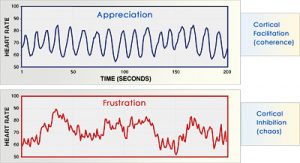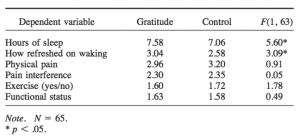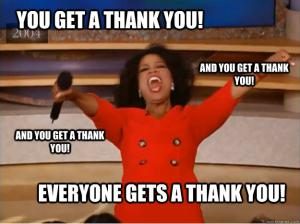Theresa Bui | Blogger | SQ Online (2016-17)
Happy Thanksgiving! I can’t wait to stuff my face with mashed potatoes, lechon, and grilled corn. Let’s start this blog off by adding to the warm Thanksgiving vibes. I’ll go first, so just hold your thought for a second. I am very, very thankful that I only have two consecutive midterms on week 9, right before Thanksgiving break. Go physics and ochem! Notice that I am not sarcastic at all. Okay. Maybe a little, but I could’ve easily had four if my professors felt any more devious. Now, what are you thankful for? And how do you feel? Gratuitous? Good. I wish we could do Thanksgiving acts everyday. Wait. We can. Two words: gratitude intervention.
So what is gratitude intervention? A gratitude intervention program is composed of different activities to encourage a daily gratuitous attitude. For example, it may be in the form of daily gratitude journal-keeping, saying one thing you’re grateful for every morning, or self-reflection with these 10 questions. Through these simple exercises, you can feel gratitude intervention’s psychotherapeutic effects, so there you go. A quick, cheap, and easy stress reliever. As psychology research develops, gratitude is further explored as a healing method and has been proven to have numerous benefits. According to Forbes and Psychology Today, it already has seven scientifically proven benefits, including stress reduction. Several related studies that I have found have been embedded for your personal interest.
Improving current relationships and creating relationships
- You acknowledge others for their contributions; therefore, they feel more appreciated. Honestly, I know I get crabby after a long day of studying, so this is an amazing benefits. Simply telling your friends that you appreciate them can go a long way. This is a study of the effects of gratitude in college sororities during big-little reveal week
Increasing psychological health
- According to Professor Robert A. Emmons from the University of California, Davis in The Journal of Positive Psychology, gratitude reduces anxiety and depression. You can further explore his experiment in Counting Blessings Versus Burdens: An Experimental Investigation of Gratitude and Subjective Well-Being in Daily Life.

Increasing physical health
- Gratitude promotes a healthier lifestyle: going to the gym, eating more nutritious meals, and having regular check-ups. Check out Graph 2 to see the difference an appreciative attitude can make with your heartbeat stability.
Enhancing empathy
- In A Grateful Heart is a Nonviolent Heart, a study conducted by University of Kentucky in 2011, those who ranked higher on the gratitude scale are less likely to engage in aggressive behavior and seek retaliation.
Improving sleep
- Daily gratitude journaling 15 minutes before bed can actually change your sleep quality. It allows you to reflect on your day and find inner peace before bed; therefore, you will be able to sleep better and longer.

Table 1. Comparisons of Groups on Measures of Physical Well-Being (Source)
Increasing confidence
- Athletes perform better when they practice gratitude, as stated in Journal of Applied Sport Psychology. It reduces resentful and overly competitive behavior. Students are basically academic athletes. Runners train for a marathon; whereas, we study for the usual 2 midterms and a final per class. Get fit!
Increasing mental strength
- Gratitude can build that doggedness and rigidity you need during midterm season and finals week. It is a healing force against trauma. There is a study on gratitude and post-traumatic stress disorder amongst Vietnam War veterans. Definitely an interesting read!
There. We have made Thanksgiving year-round. Magic. You may not be stuffing your face with turkey and gravy every single day of the year, but at least you’re doing what counts: being thankful. I challenge you to write one thing you’re thankful for every day for two weeks. Maybe you will feel a lot less stressed. Personally, I found that this actually helped me move on with my day. I have almost completely stopped lingering on negative homework scores or quiz scores. If you ever find it hard to be thankful, here is a great list to remind you. If you ever feel under-appreciated, I am grateful for you. Once again, happy Thanksgiving. May your holidays be warm and cozy.

[hr gap=”0″]
Sources:
- https://www.pachamama.org/blog/10-questions-to-bring-more-awareness-to-your-gratitude-practice
- http://spp.sagepub.com/content/3/2/232.short
- http://www.tandfonline.com/doi/abs/10.1080/01443410903493934
- http://toddkashdan.com/articles/gratitudevets_BRAT.pdf
- http://ei.yale.edu/wp-content/uploads/2013/11/jclp22020.pdf
- https://www.psychologytoday.com/blog/what-mentally-strong-people-dont-do/201504/7-scientifically-proven-benefits-gratitude